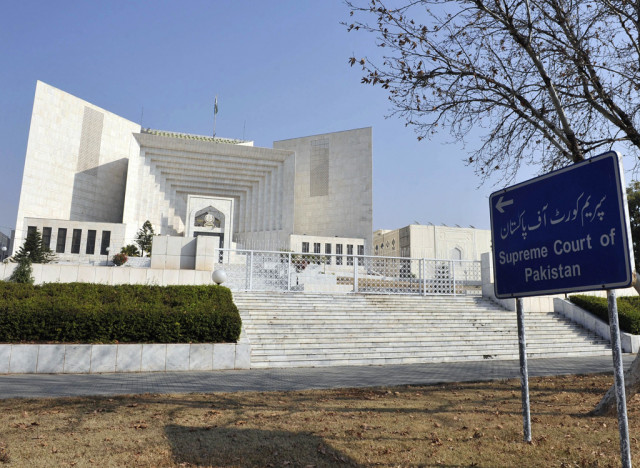Appeal in court: SC changes Rangers official’s death sentence into life term
Five Rangers and a civilian were convicted by an ATC for Sarfaraz Shah’s murder.

The Supreme Court (SC) changed the death sentence of a Rangers' official into a life term in the murder case of Sarfaraz Shah.
Convict Shahid Zafar, four other Rangers personnel and a civilian were convicted by an anti-terrorism court for killing an unarmed young man, Sarfaraz Shah, at point-blank range at a park on Boat Basin, Clifton. Their sentences were upheld in the Sindh High Court later.
On Friday, a full bench, comprising justices Sarmad Jalal Osmany, Gulzar Ahmed and Muhammad Athar Saeed, dismissed the appeals of the four other convicted personnel and a civilian against life terms and fines. The sentences of the remaining four Rangers personnel - sub-inspector Bahur Rehman, Lance Naik Liaquat Ali, constable Mohammad Tariq, constable Minthar Ali and constable Mohammad Afzal - were upheld by the SC. Civilian Afsar Khan, who was a private contractor, was released since his life imprisonment was shortened to three years, which he has already served.
The unanimous judgment came in response to the appeals filed by the five Rangers personnel and civilian against rejection of their appeals and compromise with the victim's family by the Sindh High Court (SHC).
The three judges watched the footage on Friday. They also examined a judgment rendered by the SC through which a death convict's sentence was commuted into life imprisonment, as was referred by the appellants' lawyer. The bench passed the judgment, changing Shahid Zafar's death sentence into life imprisonment. Salik Shah, the brother of the victim, also appeared and informed the judges that they have pardoned the convicts in the name of God.
Viral video
Sarfaraz Shah was shot dead by Rangers personnel inside Karachi's Shaheed Benazir Bhutto Park on June 8, 2011. Initially, the paramilitary force claimed that he was a dacoit and was killed during an encounter.
Later, a video footage emerged that showed the Rangers men beating and dragging the unarmed 19-year-old boy, who was in turn begging for his life. It also showed the men shooting him and leaving him to die.
Taking suo motu notice, the then Supreme Court chief justice Iftikhar Chaudhry had ordered the registration of a murder case against the personnel visible in the video. In addition, the then Rangers DG and Sindh police IG were removed from their posts to ensure fair investigations.
Rare judgment
In a judgment against law enforcement personnel, the anti-terrorism court had convicted and sentenced the accused under Section 7(a) of the Anti-Terrorism Act (ATA) 1997, read with Sections 302 and 34 of the Pakistan Penal Code (PPC) on August 12, 2011.
Zafar was given the death sentence, while Rehman, Ali, Tariq, Minthar, Afzal and Khan, were sentenced to life imprisonment. Moreover, all were ordered to pay a fine of Rs200,000 each or undergo an additional six months of jail. They were also ordered to pay Rs100,000 each in compensation to the legal heirs.
Rejected compromise
In a surprising move, the victim's family had later "pardoned the convicts in the name of God," without accepting blood money. An SHC bench, headed by Justice Sajjad Ali Shah, had on June 21, dismissed the convict's appeals and rejected the compromise, observing that the "offence cannot not be pardoned through a compromise." The high court had also upheld sentences and fines awarded to the convicts, but acquitted one co-accused, Liaquat Ali, for want of evidence. The convicts appealed to the Supreme Court against the SHC judgment.
Terror or murder
The apex court had called the original video-footage of the incident, which was surprisingly recorded by the camera crew of a private television channel and had gone viral, "to see whether the offences committed by the appellants falls within the ambit of the Anti-Terrorism Act 1997".
According to the Rangers lawyer, Khawaja Naveed Ahmed, the case does not fall within the ambit of the strict anti-terror law, as their act had not panicked or terrorised the public at large.
Published in The Express Tribune, August 30th, 2014.


















COMMENTS
Comments are moderated and generally will be posted if they are on-topic and not abusive.
For more information, please see our Comments FAQ